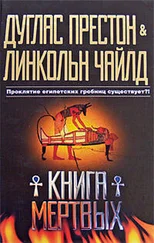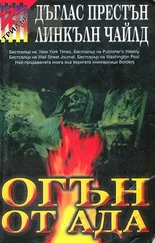He had also worked up a cover story. He knew that as soon as a stranger started going around a small, isolated town like this, asking questions, the whole place would go from wary curiosity to high alert.
Crossing the little square, with its collection of trees with whitewashed trunks, he entered the market. He went up to a woman selling guinea pigs in little wire cages, smiled, held out his hand, and introduced himself in Spanish, quickly removing one of the business cards he had printed up the evening before.
“I am Señor Lunafría,” he said, “attorney-at-law.”
Upon hearing this, the woman shut down, her face hardening into a mask of suspicion.
“I’m looking for Señorita Ramona Osorio Ixquiac.”
He was gratified to see a flicker of recognition in the woman’s face at the name. “What do you want with her?”
“I have important news.”
The woman looked at him a long time, with an impassive face — so long that he began to feel uncomfortable. Maybe this wasn’t the best way to go.
Coldmoon leaned forward and lowered his voice. “If not her, is there an Ixquiac family member here that I can speak to? It’s a confidential matter.”
At this the woman turned and called out to a nearby seller, saying something in an Indian language. The other woman’s eyes widened and she left her stall and came over. She stared at Coldmoon.
“ I am Ramona Osorio Ixquiac. What’s this all about?”
Coldmoon thought fast, stunned at how quickly he’d succeeded in finding an Ixquiac. If this was Ramona, then the foot must belong to her sister Martina. He said, “I am here about your sister, Señorita Martina.”
At this her eyes widened. “My sister? Oh, thank God, we haven’t heard from her in so long! Come, please come, to my house and tell me all about her, where she is, what she’s doing in America!” Her eyes shone with mixed excitement and apprehension and Coldmoon’s heart fell at what he would have to tell her. But maybe not everything — not just yet.
Ramona’s house stood at the edge of the ravine leading down to a river. The house was surrounded by several small, terraced kitchen gardens. The mist was continuing to lift and now a streak of sunlight pierced the cloud cover, making a bright moving spot on a distant hillside.
The house was built of pale-blue-washed cinder blocks and neat as a pin, down to checked curtains and a clay jug of flowers on the kitchen table.
“Please be at home,” said Ramona, offering him a seat.
Coldmoon sat and the woman busied herself with a pot of coffee simmering on a woodstove. She poured two mugs and brought them over with a bowl of sugar and a jug of cream.
Raising the mug, Coldmoon caught the scent of dark, burnt, acidic coffee. “Just the way I like it,” he said, taking a sip. And it was delicious: finally, a cup of coffee resembling what he knew from growing up on the rez.
Ramona took a seat with her own cup of coffee and placed a dish of chuchitos on the table. “Please tell me all about my sister.”
“I’m afraid I don’t have good news,” said Coldmoon. God, how much should he tell her? “Your sister seems to be missing.”
“ Missing? ” Ramona held her hand to her mouth. “This is as I feared! What’s happened?”
“It seems...” Coldmoon hesitated. He didn’t know what to say, so he took her hand. “It seems she may be in trouble.”
“Oh!” She gasped, tears springing into her eyes. “I told her not to go, I begged her, I was so afraid!”
“We don’t know for sure what’s happened to her. That’s what I’m investigating. I need your help. Please tell me what you know.”
She dabbed at her eyes. “As you can see, we’re very poor here in San Miguel. My sister, she kept talking about going north, to the USA. It wasn’t just her — everybody was talking about it. How rich everyone is up there, how an honest person who works hard can have a good life, that people have all the food they need and a house and maybe even a car, how every child can go to school. I knew it was a lot of exaggeration. But the desire to leave is like a fire in this town.”
“When did she leave?”
“It was just before the Feast of the Immaculate Conception, in early December.”
“You mean over four months ago?”
“Yes.”
“Tell me how that came about.”
“My sister became part of a group planning to go, and finally somebody contacted a man who knew how to get them over the border into Mexico, and from there, he knew another man who was a coyote, who could get them into the United States. It’s easy getting into Mexico. The hard part is getting into the U.S.”
“Who is this man?”
“His name is Zapatero. Jorge Obregón Zapatero. He got them all together — and one day they just left.” And at this she dabbed her eyes again.
“How many of them were in the group?”
“About twenty. But...” She took a deep, shuddering breath. “We worried that something bad must have happened, because we’ve heard nothing since. Nothing. Not one person in that group has written or called. Zapatero swears he turned them over to the other coyote in Mexico. But it’s as if they vanished.”
“What did Zapatero charge for this service?”
“A thousand quetzals.”
Coldmoon did a quick calculation — about $130. “That’s not much.”
“Yes, but then they had to pay another thirty thousand quetzals to the coyote in Mexico.”
“I see. And who was that coyote?”
She shrugged. “Who knows?”
“Zapatero must know.”
“He won’t say. He says he did his job right. He thinks they were caught at the border and jailed in the United States.”
“Where is Zapatero now?”
“He’s organizing another group to leave in a month or so.”
“Why would more people go if the others disappeared?”
There was a long silence. “Because people have hope. Here, we have no hope.”
Smithback lay on his mattress, staring at the ceiling. Bugs were crawling on it, and he watched their progress without interest.
The first couple of days he’d been locked up in here, he could think of nothing but escape. He’d thought of everything — breaking down the door; trying to reach the ridiculously high, ridiculously small window; yanking at the shotgun that appeared when they tossed in food, in hopes of pulling the thug in with it and overpowering him — yet nothing even remotely likely had suggested itself. But now, after his little “talk” with Bighead, he could do little but lie on the rude bed and hope for sleep. It was as if the hulking bastard and his fearsome threats had beaten all hope out of him.
Once again he cursed his own habit of sudden travel with no notice to his friends or colleagues. What the hell was Kraski doing? Calling the cops? No, the son of a bitch was probably just bitching and moaning about his absence. Maybe he’d sent out a couple of co-reporters to sniff around. Useless bastards, they couldn’t empty piss out of a boot.
At first he thought the gang boss had ruptured his internal organs. But today, his gut felt a hell of a lot better than it had the day before. And his eye, too, was clearly less swollen.
Of course, none of this mattered in the long run. He knew now that it was just a matter of time before they killed him. I’m going to ask around. See if maybe you speak a little truth. Then I’ll come back and break you in. Somehow, instead of motivating him to escape, Bighead’s words had filled him with despair.
There had been no sign of the motherfucker for a day now. Smithback still didn’t know exactly what the hell was going on, but as best he could tell from the talk he heard through the door, it had to do with a shipment of drugs, cocaine, that had gone missing on the Arizona border, somehow involving trucks with their numbers painted out. And Bighead seemed to be on the hook for it. Smithback felt certain that all this was the reason the bastard was away so much of the time — trying to mitigate the damage and figure out what had gone wrong.
Читать дальше










![Линкольн Чайлд - Стихи для мертвецов [litres]](/books/396536/linkoln-chajld-stihi-dlya-mertvecov-litres-thumb.webp)

